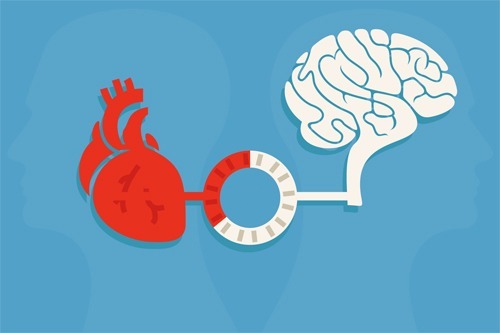To reduce heart disease and stroke risks, regulate stress and improve brain health
How stress may increase risk of heart disease and stroke (ScienceDaily):
“Heightened activity in the amygdala — a region of the brain involved in stress — is associated with a greater risk of heart disease and stroke, according to a study published in The Lancet that provides new insights into the possible mechanism by which stress can lead to cardiovascular disease in humans…In this study, 293 patients were given a combined PET/CT scan to record their brain, bone marrow and spleen activity and inflammation of their arteries. The patients were then tracked for an average of 3.7 years to see if they developed cardiovascular disease…
Those with higher amygdala activity had a greater risk of subsequent cardiovascular disease and developed problems sooner than those with lower activity…The authors suggest a possible biological mechanism, whereby the amygdala signals to the bone marrow to produce extra white blood cells, which in turn act on the arteries causing them to develop plaques and become inflamed, which can cause heart attack and stroke…
Dr Ilze Bot, Leiden Academic Centre for Drug Research, Leiden University, The Netherlands, said: “In the past decade, more and more individuals experience psychosocial stress on a daily basis. Heavy workloads, job insecurity, or living in poverty are circumstances that can result in chronically increased stress, which in turn can lead to chronic psychological disorders such as depression.” She says that more research is needed to confirm the mechanism but concludes: “These clinical data establish a connection between stress and cardiovascular disease, thus identifying chronic stress as a true risk factor for acute cardiovascular syndromes, which could, given the increasing number of individuals with chronic stress, be included in risk assessments of cardiovascular disease in daily clinical practice.”
Study: Relation between resting amygdalar activity and cardiovascular events: a longitudinal and cohort study (The Lancet). From the abstract:
- Background: Emotional stress is associated with increased risk of cardiovascular disease. We imaged the amygdala, a brain region involved in stress, to determine whether its resting metabolic activity predicts risk of subsequent cardiovascular events.
- Findings & Interpretation: In this first study to link regional brain activity to subsequent cardiovascular disease, amygdalar activity independently and robustly predicted cardiovascular disease events. Amygdalar activity is involved partly via a path that includes increased bone-marrow activity and arterial inflammation. These findings provide novel insights into the mechanism through which emotional stressors can lead to cardiovascular disease in human beings.
Learn more:



